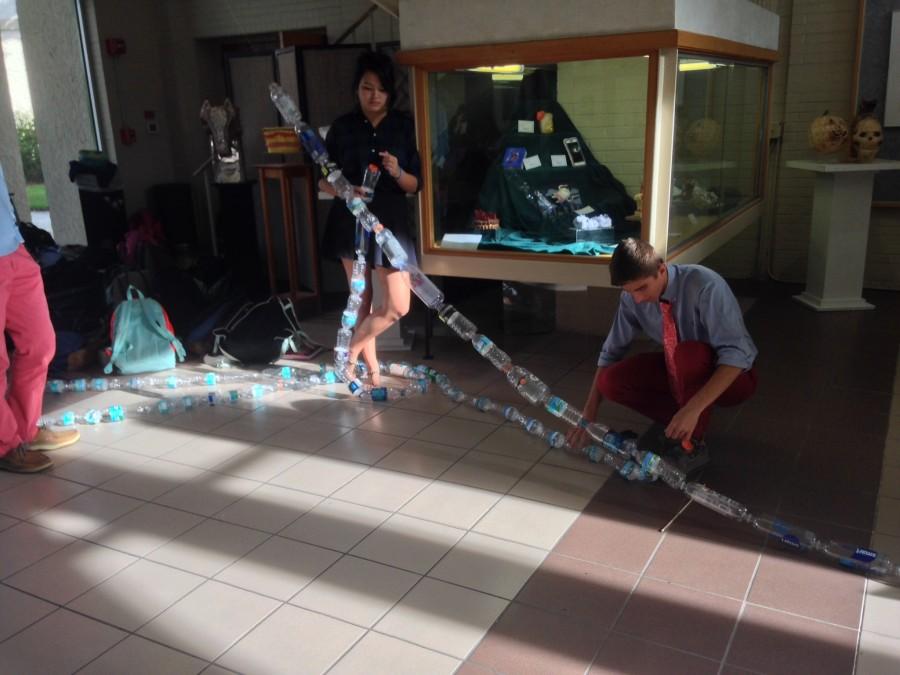The Cost of Not Recycling
Dr. Moyer and the Environmental Science class spotlights the plague of water bottles effecting our planet and how students can contribute to a healthier planet.
Environmental Science students make a train of water bottles.
You see them during sports practice, lunch, activities, and between classes. What are they? Water bottles.
Bottles of water have permeated our culture to such an extent that we sometimes forget they need to be disposed of carefully. “Even though they are recyclable, they too often don’t get recycled,” said Dr. Moyer, who is spearheading an environmental science project to encourage Bolles students to recycle their water bottles. “They end up in oceans and rivers where they end up in the food supply or kill birds and other creatures.”
Americans drink more bottled water than any other country, and high school students are a big part of the problem. Many of us grab a plastic bottle during the day and then throw it away after school in the most convenient location, never checking to see if we are recycling or not.
“They[water bottles] end up in oceans and rivers where they end up in the food supply or kill birds and other creatures.”
— Dr. Moyer
To spotlight this problem, Bolles’ Environmental Science class will create a sculpture by stringing together plastic bottles to show just how much plastic waste the school generates. “Right now, we produce over 100,000 plastic bottles at Bolles,” Dr. Moyer stated. Last year, his Environmental Science class addressed this problem by requesting water filling stations to fill their own reusable water bottles.
For most, recycling is a matter of convenience. The energy saved by recycling one bottle seems trivial compared to the energy it takes to find a recycling bin. But did you know that recycling one water bottle can create enough energy to power a sixty watt bulb for six hours? And now, Bolles students really have no excuse: almost every Bolles classroom has a recycling bin, and the Canteen and Verlander Dining Hall each have at least one recycling bin as well as nearby bottle filling stations.
One of the main ways Bolles has introduced recycling and being environmentally friendly is by implementing the Green Team in 2012 with Cathleen Murphy leading the program. The Parent Association Green team was created to facilitate sustainable practices for all PA events, meetings, and activities.
The PA Green Team hosts two main events during the year: the Green Apple Day of Service in September and Earth Day in April. The Green Apple Day of Service gives parents, teachers, students, companies and local organizations the opportunity to transform all schools into healthy, safe, and productive learning environments through local service projects.
Currently the Bolles Green Team is helping promote the use of reusable water bottles at campus water bottle filling stations through the Green Bottle Movement water bottle sales in December and February. The team is also promoting the proper use of recycling bins on campus by working with administration, as well as with the school’s food service, Aramark, to help ensure everyone knows what can be recycled on campus. Bolles uses single-stream recycling, meaning there is no need for sorting the recyclables into different bins. The items we recycle on campus include paper, aluminum cans, steel cans, plastics, and cardboard. Cathleen Murphy said, “Basically, anything you can recycle at home, you can recycle at school and there’s no need to sort.”
The PA Green Team continues to support the administration’s efforts to add more recycling bins on campus. Over the last two years, the PA Green Team helped repurpose a total of 40 “retired” plastic trash bins by painting them blue and labeling them for recycling. The “new” blue bins can now be found on the football field and Bartram Campus. In an email, Murphy stated: “When needed, the PA Green Team is always happy to assist the administration, faculty and student body with green efforts on campus.”
People have recycled since the beginning of time. Ancient civilizations would melt down their swords and other household items to make coins; and for decades in the twentieth century, Americans recycled metal cans. Then plastic water bottles were invented, and the demand for recycling increased incredibly. If you lined up the plastic water bottles thrown away every year, they would circle the Earth four times.
Studies show that only about twelve percent of water bottles are recycled, which means eighty eight percent of this plastic ends up permanently in landfills. So, the next time you’re tempted to pitch your water bottle without recycling it, take a second look at the sculpture that Dr. Moyer’s students have created. It calls attention to a problem that permeates our world. Bolles students are leaders in many ways. Now, we should lead the way to support our environment by recycling all plastic water bottles.



